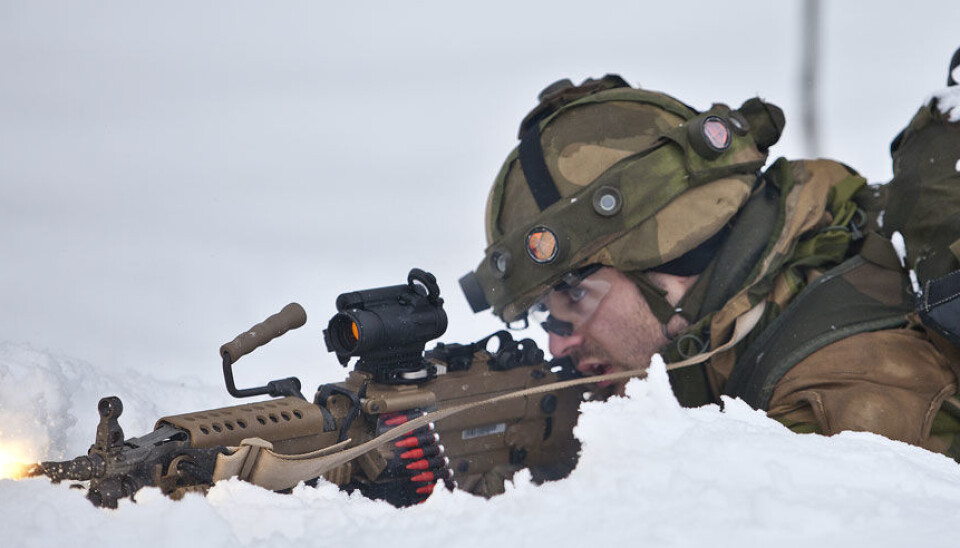
Funding to defend industry, or defend Norway?
New EU regulations can force the Norwegian government to make a choice. Will it subsidise the defence industry to promote national security, or is economic stimulus the major aim? A researcher says we should go for the first option.
Denne artikkelen er over ti år gammel og kan inneholde utdatert informasjon.
Business has been booming in recent years for the segment of Norwegian industry that produces weapons, ammunition and other materiel for warfare.
Military-related exports have doubled in the past decades, reaching 655 million euro annually.
A recently completed research project from the Norwegian Institute of International Affairs (NUPI) and the Nordic Institute for Studies in Innovation, Research and Education (NIFU) shows that Norwegian government subsidies to the domestic defence industry are ineffective.
The state is trying to have its cake and eat it too when it financially supports defence firms to make the country safer, while simultaneously attempting to boost Norwegian industry and exports.

Such funding is either channelled through the Ministry of Defence or through the organisation Innovation Norway.
“From an economic perspective it would be better if the industry were backed by either one or the other, not both,” says project manager Fulvio Castellacci.
If the reason for supporting the Norwegian defence industry is to safeguard the country’s national security, the State should place its bets on the bigger corporations.
National security or economic growth?
The project INNDEF (Innovation and Defence Industrial Policy) was led by Castellacci and Arne Fevolden of NIFU. They found that much of the industry’s recent success can be attributed to the major wars in recent years − Afghanistan and Iraq.
But the defence industry is important to the state and the corporations get plenty of the taxpayers’ money.
The Ministry of Defence wants to ensure that the country is reasonably self-sufficient in production of weaponry in case of future conflict. Innovation Norway is less focused on national security and more interested in exports as the objective − and in the potential spin-offs that benefit general industry and society.
Non-member Norway is affiliated with the EU and subjected to its regulations. The EU is implementing a further liberalisation of the European defence market. This means that Norwegian firms will face more competition from foreign enterprises in winning Norwegian contracts.
Should focus on strategic defence industry
The Norwegian defence industry consists of around 100 companies. However, it is dominated by a few large ones, such as Nammo, Raufoss ASA and Kongsberg. They manufacture munitions, weapon stations, electronics and an array of other military products.
Most of the government support they get is from the Ministry of Defence.
The rest of the industry consists of small and medium-sized firms that supply materiel and technology to military forces around the world.
For instance the company Prox Dynamics delivers tiny drones that are used in Afghanistan. In 2011, Prox received about 455,000 euro from Innovation Norway.
So what should Norway do, given a choice that would entail supporting either Nammo or Prox? There’s no clear answer, but Castellacci says the study indicates the country’s better option.
“We ran simulations using a simplified model of the Norwegian defence industry and it indicates it would be more effective in the country were to focus on the strategic aspects of the industry. These are vital in a national security perspective and we should channel funding through the Ministry of Defence,” he says.
“This would mean cuts in support to smaller firms, which are vital to certain segments of the Norwegian economy, but not all that important for the industry itself.”
Specialisation will work
The change in EU regulations will pose problems for the Norwegian companies but the INNDEF projections indicate that the industry is strong enough to get by on its own without the help of Mother Norway.
“According to our studies the EU directive opening the European market to more competition will be initially challenging. But in the long run, in the course of ten or twenty years, the companies will thrive on it,” says Castellacci.
“Short term, the biggest corporations will be most affected because they currently receive the most public funding and win the major contracts. But they also have the greatest capacity and are better adapted to international competition. If the Norwegian industry opts for niche products in which it can excel, the companies will be competitive in a more open market.”
-----------------------------
Read the Norwegian version of this article at forskning.no
Translated by: Glenn Ostling
Scientific links
- F. Castellacci and A. Fevolden (2012) Capable companies or changing markets? Explaining the export performance of firms in the Norwegian defence industry, NUPI Working Paper nr. 795
- M. Blom, F. Castellacci and A. Fevolden (2012) The trade-off between Innovation and Defence Industrial Policy: A Simulation Model Analysis of the Norwegian Defence Industry”,Technological Forecasting and Social Change






























